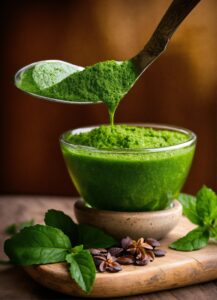Spirulina is a type of blue-green algae that grows in both fresh and saltwater. It has gained popularity as a superfood due to its high nutritional content. Spirulina is packed with protein, vitamins, minerals, and antioxidants, making it a valuable addition to any diet. In this article, we will explore the various health benefits of spirulina, particularly its role in combating protein deficiency.
Spirulina’s Nutritional Composition
Spirulina is a nutrient-rich superfood, containing a wide range of vitamins, minerals, and antioxidants. It is particularly high in protein, with about 60% of its dry weight consisting of protein. Spirulina also contains significant amounts of vitamins A, C, E, and B vitamins, as well as minerals such as iron, calcium, and magnesium. Additionally, spirulina is a rich source of antioxidants, including phycocyanin and beta-carotene, which help protect cells from damage.
Spirulina’s Benefits for Protein Deficiency
Protein is essential for building and repairing tissues in the body, making it crucial for overall health. Spirulina is an excellent source of protein, containing more protein per gram than many other foods. In fact, spirulina contains five times more protein than eggs and three times more than chicken. This makes it an ideal food for vegetarians, vegans, and anyone looking to increase their protein intake. Consuming spirulina can help prevent protein deficiency and promote muscle growth and repair.
Also Read About Health Benefits Of Moringa Here
Controlling Blood Sugar with Spirulina
Maintaining healthy blood sugar levels is essential for overall health, especially for individuals with diabetes. Spirulina has been shown to help regulate blood sugar levels, making it beneficial for diabetics and those at risk of developing diabetes. Spirulina contains compounds that improve insulin sensitivity and reduce blood sugar levels, helping to prevent spikes and crashes in blood sugar levels.
Weight Loss and Spirulina
Obesity is a major health concern worldwide, and many people struggle to lose weight. Spirulina may help with weight loss due to its high protein and nutrient content. The beta-carotene, fatty acids, chlorophyll, and other nutrients in spirulina can help reduce excess fat in the body, promoting weight loss. Additionally, the vitamins and minerals in spirulina can improve skin health and promote a youthful appearance.

Img Src:-HealthLine.com
Spirulina for Cancer Prevention
Cancer is a devastating disease that affects millions of people worldwide. Spirulina has been studied for its potential role in cancer prevention and treatment. The antioxidants and nutrients in spirulina help protect cells from damage and reduce inflammation, which are important factors in cancer development. Some studies suggest that spirulina may help reduce the risk of certain types of cancer, although more research is needed in this area.
Spirulina and Heart Health
Heart disease is a leading cause of death worldwide, and maintaining heart health is crucial for overall health. Spirulina has been shown to have several benefits for heart health. It can help reduce bad cholesterol levels, increase good cholesterol levels, and improve blood flow, which is important for heart health. Including spirulina in your diet can help support a healthy heart and reduce the risk of heart disease.
Also Read https://yadfarm.com/triphala-indian-ancient-secret-to-health/
Incorporating Spirulina into Your Diet
Spirulina is available in powder, tablet, and capsule form, making it easy to incorporate into your diet. You can add spirulina powder to smoothies, juices, or water for a quick and easy way to boost your nutrient intake. Spirulina tablets and capsules are also available for those who prefer a more convenient option. It is important to follow the recommended dosage instructions for spirulina to avoid any potential side effects.
Spirulina’s Role in Ayurvedic Medicine
Ayurveda is an ancient Indian system of medicine that uses natural remedies to promote health and well-being. Spirulina has been used in Ayurvedic medicine for centuries due to its various health benefits. It is believed to help balance the body’s doshas, or energies, and promote overall health and vitality. Spirulina is often used in Ayurvedic formulations to treat various ailments and improve overall health.
Spirulina Side Effects and Precautions
While spirulina is generally considered safe for most people, there are some potential side effects and precautions to be aware of. Some people may experience digestive issues, such as stomach cramps, nausea, or diarrhea, when first starting to take spirulina. Additionally, spirulina can interact with certain medications, so it is important to consult with a healthcare professional before adding spirulina to your diet, especially if you are taking medication or have a medical condition.
Conclusion
In conclusion, spirulina is a nutrient-rich superfood that offers a wide range of health benefits. From combating protein deficiency to promoting heart health and aiding in weight loss, spirulina is a valuable addition to any diet. Whether you choose to add spirulina powder to your smoothies or take it in tablet form, incorporating spirulina into your diet can help support overall health and well-being.
Click Here For More Healthy Tips and Latest Updates
FAQs
- Is spirulina safe for everyone?
- Spirulina is generally safe for most people, but individuals with certain medical conditions or those taking medication should consult with a healthcare professional before taking spirulina.
- How much spirulina should I take daily?
- The recommended dosage of spirulina can vary depending on individual needs and health goals. It is best to follow the dosage instructions on the product label or consult with a healthcare professional for personalized advice.
- Can spirulina help with hair growth?
- Some studies suggest that spirulina may help promote hair growth due to its nutrient-rich composition, but more research is needed to confirm its effectiveness for this purpose.
- Are there any side effects of taking spirulina?
- While spirulina is generally safe, some people may experience digestive issues or allergic reactions. It is important to start with a small dose and monitor for any adverse effects.
- Where can I buy spirulina?
- Spirulina is available at health food stores, pharmacies, and online retailers. It is important to purchase spirulina from a reputable source to ensure its quality and purity.










